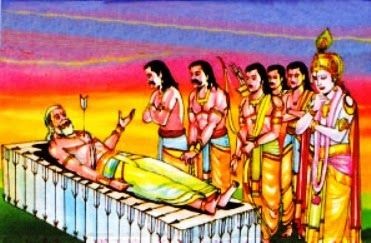खण्डः-V
As one ever established in Brāhmaṇ, Sukacharya did not accept any ignorance whatsoever in Parikshit.
As Darkness is not real to the Sun, to the Knower of Đ Self,
Ignorance has no existence.
(1/9)
#ŚrutiGītā
As one ever established in Brāhmaṇ, Sukacharya did not accept any ignorance whatsoever in Parikshit.
As Darkness is not real to the Sun, to the Knower of Đ Self,
Ignorance has no existence.
(1/9)
#ŚrutiGītā

Hence, in the 7 days that followed, Sukacharya leisurely expounded upon the Bhagavāta Purāna without any anxiety whatsoever.
Even though Parikshit lamented that he had only 7 days left to live,
Sukacharya consoled him
& said,
Even though Parikshit lamented that he had only 7 days left to live,
Sukacharya consoled him
& said,
वरं मुहूर्तं विदितं घटते श्रेयसे यतः।
ŚB 2.1.12
'One moment is all you need to attain d Highest. Have No fear at all.
But for You,
सप्ताहं जीवितावधिः।
You have 7 long days to Live!
Once You come to know your real Nature, You will wake Up to d Immortal,
Bodiless Nature of Đ Self.'
ŚB 2.1.12
'One moment is all you need to attain d Highest. Have No fear at all.
But for You,
सप्ताहं जीवितावधिः।
You have 7 long days to Live!
Once You come to know your real Nature, You will wake Up to d Immortal,
Bodiless Nature of Đ Self.'

When the Mind becomes Pure, One beholds Within oneself the infinitude of the Ātman like the boundless Sky;
यथा खं अमलाशयः।
It is this ever-attained natural state of oneself that the Guru points to.
This is the Essence of Śruti Gītā.
In a way, Đ entire Bhagavāta is a Śruti Gītā.
यथा खं अमलाशयः।
It is this ever-attained natural state of oneself that the Guru points to.
This is the Essence of Śruti Gītā.
In a way, Đ entire Bhagavāta is a Śruti Gītā.
निगमकल्पतरोर्गलितं फलं।
(ŚB 1.1.3)
Nigama is Śruti, & it's fruit is the experience of Brāhmaṇ.
Once Realised,
Renunciation becomes natural like the fruit (र्गलितं).
Such a one is Sukacharya, & his experience is Bhagavāta.
(ŚB 1.1.3)
Nigama is Śruti, & it's fruit is the experience of Brāhmaṇ.
Once Realised,
Renunciation becomes natural like the fruit (र्गलितं).
Such a one is Sukacharya, & his experience is Bhagavāta.

य: स्वानुभावमखिलश्रुतिसारमेक-
मध्यात्मदीपमतितितीर्षतां तमोऽन्धम्।
संसारिणां करुणयाह पुराणगुह्यं
तं व्याससूनुमुपयामि गुरुं मुनीनाम्॥
(ŚB 1.2.3)
He, out of Compassion for those who suffer in the World, gave out his own Innermost experience which is the essence of all Upaniṣhads.
मध्यात्मदीपमतितितीर्षतां तमोऽन्धम्।
संसारिणां करुणयाह पुराणगुह्यं
तं व्याससूनुमुपयामि गुरुं मुनीनाम्॥
(ŚB 1.2.3)
He, out of Compassion for those who suffer in the World, gave out his own Innermost experience which is the essence of all Upaniṣhads.

This lamp of realisation is Bhagavāta.
When a dispassionate seeker approaches an enlightened Rṣi, that which is transmitted from the heart of Đ Guru is Śruti Gītā.
Nārāyaṇa~Brahmā~Nārada~Vyāsa~Suka~Parikshit ;
Đ Knowledge that is transmitted in this succession is also nothing
When a dispassionate seeker approaches an enlightened Rṣi, that which is transmitted from the heart of Đ Guru is Śruti Gītā.
Nārāyaṇa~Brahmā~Nārada~Vyāsa~Suka~Parikshit ;
Đ Knowledge that is transmitted in this succession is also nothing

but Śruti. From Suka, Suta too received it, & He, in turn,, Spoke to the Ṛṣis in Naimisharanya.
This is also Śruti.
What Maitreyi spoke to Vidura is also the same.
Kapila to his Mother,
Rishabha to his sons & subjects,
Bhārata to Rahugana...
This is also Śruti.
What Maitreyi spoke to Vidura is also the same.
Kapila to his Mother,
Rishabha to his sons & subjects,
Bhārata to Rahugana...
Thus goes the list of innumerable speakers.
Later,
Śrī Kṛṣṇa gave it to Uddhava who sought it directly from him.
Even now,
The teaching that is transmitted from an authentic teacher to an earnest disciple is the same Primordial song of Śruti.
to be Continued.,,
Later,
Śrī Kṛṣṇa gave it to Uddhava who sought it directly from him.
Even now,
The teaching that is transmitted from an authentic teacher to an earnest disciple is the same Primordial song of Śruti.
to be Continued.,,

ll हरी ॐ तत् सत् ll
।। जयतु सनातन धर्मः।।🙏
Link for the खण्डः-i ii iii & iv of Śruti Gītā 👇
।। जयतु सनातन धर्मः।।🙏
Link for the खण्डः-i ii iii & iv of Śruti Gītā 👇
https://twitter.com/AdiShloka/status/1492867601139073024?t=G4Ii-EB73t1Es5pgQwhJ5g&s=19
• • •
Missing some Tweet in this thread? You can try to
force a refresh









